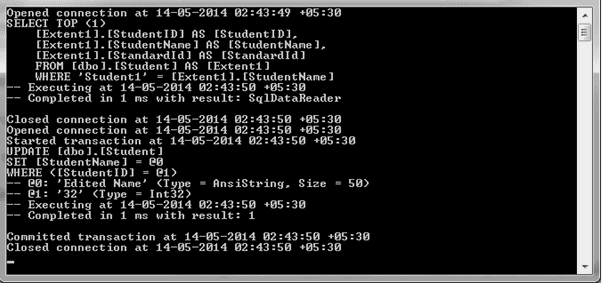Logging Database Commands in Entity Framework 6
Here, you will learn how to log commands & queries sent to the database by Entity Framework 6.
Prior to EF 6, we used the database tracing tool or a third-party tracing utility to trace database queries and commands sent by Entity Framework.
Now, EF 6 provides the DbContext.Database.Log property to log the SQL generated by DbContext.
The Log property is of Action<string> type, so you can attach a delegate method with the string parameter and return void.
The following example demonstrates logging EF activities to the console.
using (var context = new SchoolDBEntities()) { context.Database.Log = Console.Write; var student = context.Students .Where(s => s.StudentName == "Student1") .FirstOrDefault<Student>(); student.StudentName = "Edited Name"; context.SaveChanges(); }
Output:

In the above example, the Console.Write() method is attached to the Log property because it accepts the string parameter and returns void.
You can see in the output that it logs all the activities performed by EF, e.g. opening & closing the connection, execution & completion time and database queries & commands.
You can attach a method of your custom class to the Log property.
The following example uses the method of custom class to log the SQL.
public class Logger { public static void Log(string message) { Console.WriteLine("EF Message: {0} ", message); } } class EF6Demo { public static void DBCommandLogging() { using (var context = new SchoolDBEntities()) { context.Database.Log = Logger.Log; var student = context.Students .Where(s => s.StudentName == "Student1") .FirstOrDefault<Student>(); student.StudentName = "Edited Name"; context.SaveChanges(); } } }